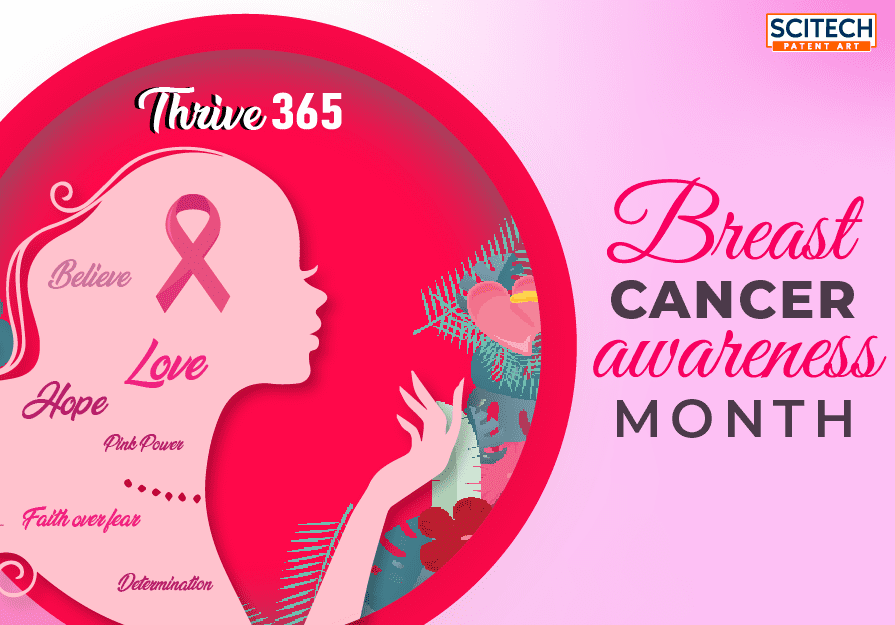As per the World Health Organization (WHO) data of 2020, about 25% of women worldwide suffer from breast cancer and it has been reported the most commonly occurring cancer in women. Recent prediction shows that 297,790 new cases of invasive breast cancer has been diagnosed in U.S. women in 2023, whereas it’s 2,800 new cases in men. People with family history of breast cancer and those who were born with genes BRCA1 and BRCA2 are at higher risk of breast cancer. Smoking and alcohol consumption, being overweight, hormone therapy during child-bearing age and after menopause are the most predominant factors associated with the alarming rise of breast cancer in the urbanized and industrial world.

Current review is showing that the 5-year relative survival rate of breast cancer patients is 99% if the cancer is localized only in the breast (stage I-II), 86% if spread in localized tissues and lymph nodes (stage II-III), and 28% if spread in other parts of the body (stage IV). The data indicates that complete recovery from breast cancer is significantly high among all the other cancers if diagnosed at an early stage. Self or clinical examination about the changes in contours or normal feel of the breast at an early age (>20), annual mammography after 35-40 years of age and breast MRI those who are genetically susceptible can lead to protection and early detection of breast cancer. Women need to overcome the misconceptions and social stigmas about breast cancer, prioritize their health and have greater awareness about breast cancer treatment.
The treatment option of breast cancer varies depending on age and overall health. Depending on the tumor grade, presence of hormone receptors, HER2 status and how far the cancer cells have spread, doctors take the decision. The treatment of breast cancer started with “Halsted mastectomy,” which involved the removal of the entire breast, lymph nodes and chest muscles by William Halsted of John Hopkins Hospital in the late 19th century. Studies revealed 77% of 8-year disease-free survival and 82% overall survival of mastectomy-group patients, whereas it was 85% overall survival for quadrantectomy patients where partial or segmental removal of breast tissue has been performed. Apart from surgery, a few other treatment options include radiation, chemotherapy, hormone therapy, and targeted therapy. Radiation therapy has various side effects due to radiation fibrosis, whereas chemotherapy is associated with several side effects such as hair loss, neuropathy, weight loss and many others.
Research on new treatment options, alone or in combination with the existing one, are ongoing.
Treatment of breast cancer is primarily based on the presence or absence of few receptors such as:
-
- Estrogen receptor (ER),
- Progesterone receptor (PR) and
- Protein receptor (HER2).
Latest treatment methods include:
- Hormone therapy: By using certain drugs such as tamoxifen blocks the action of certain hormones and inhibit the growth of cancer cells.
- Targeted therapy: HER-2-targeted drugs including trastuzumab, pertuzumab, pyrotinib, and trastuzumab-emtansine (T-DM1) is a very common treatment option for HER2-positive patients. According to Senthil Damodaran; Professor of Department of Breast Medical Oncology, University of Texas MD Anderson Cancer Center; this targeted therapy towards breast cancer has a great potential to cure even stage-IV cancer in certain patents.
- Immunotherapy: This is another very recent type of cancer treatment option, wherein the body’s immune system recognizes and kills cancer cells. The treatment of breast cancer became more difficult and challenging when the receptors mentioned above are not present in the patient, which is termed as triple negative breast cancer (TNBC). Immunotherapy using the drug Pembrolizumab (Keytruda) in association with chemotherapy is expected to prolong the survival and quality of TNBC patients. Research on efficacy of immunotherapy and development of new treatment methods are still continuing.

This October is Breast Cancer Awareness month. There is a need for women to become aware of breast cancer and the fact that early detection and proper diagnosis can improve survival rates. Further, a healthy lifestyle and regular exercise can reduce the risk to a certain extent. As a treatment option, increasing mental strength is also becoming increasingly popular.
References:
- https://www.cancer.org/cancer/types/breast-cancer/understanding-a-breast-cancer-diagnosis/breast-cancer-survival-rates.html
- https://www.ncbi.nlm.nih.gov/pmc/articles/PMC9222657/
- https://www.sciencedirect.com/science/article/abs/pii/0277537986900118
- https://www.news-medical.net/health/What-Does-a-Quadrantectomy-Involve.aspx
- https://www.webmd.com/breast-cancer/breast-cancer-survival-rates
- https://www.doconline.com/blog/the-importance-of-breast-cancer-awareness
- https://www.cancer.gov/types/breast/research
- https://www.ncbi.nlm.nih.gov/pmc/articles/PMC6010518/
- https://www.mdanderson.org/cancerwise/6-advances-in-breast-cancer-diagnosis-and-treatment.h00-159308568.html
- https://onlinelibrary.wiley.com/doi/full/10.1002/cai2.46
Author: Dr Baisali Sarkar
